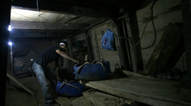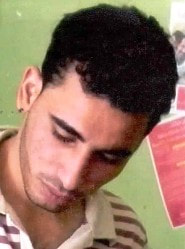1 aug 2013

On 22 July 2013, B'Tselem appealed to the Military Advocate General (MAG) against the decision to close the investigation into the killing of Ibrahim Sarhan without serving any indictments. The MAG corps notified B'Tselem that the "investigation file was closed after no evidence was found, at the level required in criminal matters, for the commission of an offense and for necessary measures". The appeal was filed after a review of the investigation file revealed that there was solid evidence that the fatal shooting of Sarhan was carried out in violation of the open-fire regulations and without any justification. A breach of open-fire regulations constitutes a criminal offense. When the regulations have been clearly violated, such as in this case, criminal sanctions must be taken and the soldier who fired the shots must be charged and tried.
Ibrahim Sarhan was shot and killed on 13 July 2011, at around 5:00 A.M. during a military operation for arresting wanted individuals in Al-Far'ah Refugee Camp, Tubas District. Sarhan was not one of the wanted individuals. According to testimonies in B'Tselem's possession and the investigative materials in the file, Sarhan came across a force numbering a few soldiers while walking through the camp. He put his hands up as ordered by one of the soldiers, but then turned around and fled the area. The soldier began a suspect apprehension procedure: he called on Sarhan to stop, fired one shot in the air, and then shot at Sarhan, hitting his thigh. Sarhan managed to flee and hid in a nearby home, but was later found by the soldiers who had gone searching for him. The soldiers gave Sarhan primary medical care, and because of his serious condition, decided to evacuate him in a Palestinian ambulance that had arrived at the scene. Sarhan died of his wounds en route to the hospital.
The soldier who shot Sarhan justified his shooting on three counts: 1) Sarhan resembled the description he had been given of one of the wanted individuals; 2) In his opinion, Sarhan fit the definition of a "fleer", a category of open-fire regulations during an arrest operation; and 3) Sarhan appeared to have committed a dangerous crime simply by virtue of his behavior. According to the soldier "when a local runs like that, he has something to lose", and if he did not have something to lose, "He would try to prove his innocence. He would talk. Heed the 'waqef' [stop, in Arabic] call and answer our questions". B'Tselem stated in its appeal that none of these reasons could justify the shooting: 1) The alleged physical resemblance was based on a very general description of the wanted person; 2) The investigation gave to a clear definition of a "fleer", which Sarhan did not meet; 3) Most importantly, open-fire regulations permit shooting at a person in cases of mortal danger, or in arresting a person suspected of a dangerous crime. However, when Sarhan was shot, none of the soldiers were in any kind of danger, and Sarhan was not suspected of any offense, certainly not a dangerous crime. The open-fire regulations stress that both disobeying an order to stop and fleeing do not, in and of themselves, suggest involvement in a dangerous crime.
Open-fire regulations do leave a great deal up to the soldiers' discretion, but not on every matter. Where the regulations make a clear determination, such as the prohibition on shooting people who are only suspected of fleeing, there is no room for making a personal choice. The purpose of open-fire regulations is to establish safety precautions and reduce the inherent risk involved in using weapons, particularly the risk of harming innocents and causing disproportionate harm.
Conducting an investigation simultaneously with an operational inquiry:
Ibrahim Sarhan was the first Palestinian killed by the military in the West Bank after the new investigation policy was introduced. According to this policy, the MAG Corps orders an immediate Military Police investigation in every case in which a Palestinian who did not participate in hostilities was killed in the West Bank.
The investigation file indicates that the MAG corps did instruct the Military Police to open an investigation on the day of the incident, but that despite the latter's efforts, operational military officials as well as high ranking officials of the Military Police Investigation Unit prevented the investigators from obtaining the soldiers' testimonies for seven days from the day of the incident place, until after the operational inquiry was concluded on July 19, 2011.
The fact that the operational inquiry was held before testimonies were collected not only delayed the criminal investigation, but also influenced the testimonies the soldiers gave during this investigation. In their testimonies, soldiers who participate in an operational inquiry are not allowed to divulge information they discover through the inquiry. When giving testimony, the soldiers involved in this incident refrained from answering the investigators' questions because they could not recall whether they knew a specific detail prior to the operational inquiry or not. This impeded the effectiveness of the investigation. Another issue that arose was misuse of this provision, for example, when the company commander refused, during his testimony, to say which soldier had fired the shots and provide the names of the other soldiers in the force. It is quite a stretch to accept his account that despite his role in the operation, he learned which soldiers made up which force only during the operational inquiry. The fact that the Military Police investigator who took his statement accepted this argument is perplexing. In addition to these issues, the Military Police failed to take any other investigative actions while the operational inquiry was going on, such as confiscating the weapons of the persons involved in the incident. After the fact, it was found that there was no dispute regarding the identity of the shooter, but this could not have been known in advance.
Unlike the situation in the past, operational inquiries no longer form the basis for deciding whether or not to launch a criminal investigation into incidents in which a Palestinian who is not taking part in hostilities is killed in the West Bank. However, the fact that such inquiries still have precedence over the criminal investigation is very troubling. The nature of the inquiry, in which all those involved give their account of the incident together, enables these individuals to – deliberately or not – coordinate their versions of the events. Moreover, the individuals who conduct the operational inquiry are authorized to take investigative actions such as collecting evidence from the scene, processing weapons and more, which could compromise the integrity of the evidence. In this situation, the inquiry does more than just jeopardize the integrity of the evidence. It effectively delays the investigation, undercuts its effectiveness and denies the investigators access to important information immediately after the incident, which is the window of time most crucial for collecting evidence.
Ibrahim Sarhan was shot and killed on 13 July 2011, at around 5:00 A.M. during a military operation for arresting wanted individuals in Al-Far'ah Refugee Camp, Tubas District. Sarhan was not one of the wanted individuals. According to testimonies in B'Tselem's possession and the investigative materials in the file, Sarhan came across a force numbering a few soldiers while walking through the camp. He put his hands up as ordered by one of the soldiers, but then turned around and fled the area. The soldier began a suspect apprehension procedure: he called on Sarhan to stop, fired one shot in the air, and then shot at Sarhan, hitting his thigh. Sarhan managed to flee and hid in a nearby home, but was later found by the soldiers who had gone searching for him. The soldiers gave Sarhan primary medical care, and because of his serious condition, decided to evacuate him in a Palestinian ambulance that had arrived at the scene. Sarhan died of his wounds en route to the hospital.
The soldier who shot Sarhan justified his shooting on three counts: 1) Sarhan resembled the description he had been given of one of the wanted individuals; 2) In his opinion, Sarhan fit the definition of a "fleer", a category of open-fire regulations during an arrest operation; and 3) Sarhan appeared to have committed a dangerous crime simply by virtue of his behavior. According to the soldier "when a local runs like that, he has something to lose", and if he did not have something to lose, "He would try to prove his innocence. He would talk. Heed the 'waqef' [stop, in Arabic] call and answer our questions". B'Tselem stated in its appeal that none of these reasons could justify the shooting: 1) The alleged physical resemblance was based on a very general description of the wanted person; 2) The investigation gave to a clear definition of a "fleer", which Sarhan did not meet; 3) Most importantly, open-fire regulations permit shooting at a person in cases of mortal danger, or in arresting a person suspected of a dangerous crime. However, when Sarhan was shot, none of the soldiers were in any kind of danger, and Sarhan was not suspected of any offense, certainly not a dangerous crime. The open-fire regulations stress that both disobeying an order to stop and fleeing do not, in and of themselves, suggest involvement in a dangerous crime.
Open-fire regulations do leave a great deal up to the soldiers' discretion, but not on every matter. Where the regulations make a clear determination, such as the prohibition on shooting people who are only suspected of fleeing, there is no room for making a personal choice. The purpose of open-fire regulations is to establish safety precautions and reduce the inherent risk involved in using weapons, particularly the risk of harming innocents and causing disproportionate harm.
Conducting an investigation simultaneously with an operational inquiry:
Ibrahim Sarhan was the first Palestinian killed by the military in the West Bank after the new investigation policy was introduced. According to this policy, the MAG Corps orders an immediate Military Police investigation in every case in which a Palestinian who did not participate in hostilities was killed in the West Bank.
The investigation file indicates that the MAG corps did instruct the Military Police to open an investigation on the day of the incident, but that despite the latter's efforts, operational military officials as well as high ranking officials of the Military Police Investigation Unit prevented the investigators from obtaining the soldiers' testimonies for seven days from the day of the incident place, until after the operational inquiry was concluded on July 19, 2011.
The fact that the operational inquiry was held before testimonies were collected not only delayed the criminal investigation, but also influenced the testimonies the soldiers gave during this investigation. In their testimonies, soldiers who participate in an operational inquiry are not allowed to divulge information they discover through the inquiry. When giving testimony, the soldiers involved in this incident refrained from answering the investigators' questions because they could not recall whether they knew a specific detail prior to the operational inquiry or not. This impeded the effectiveness of the investigation. Another issue that arose was misuse of this provision, for example, when the company commander refused, during his testimony, to say which soldier had fired the shots and provide the names of the other soldiers in the force. It is quite a stretch to accept his account that despite his role in the operation, he learned which soldiers made up which force only during the operational inquiry. The fact that the Military Police investigator who took his statement accepted this argument is perplexing. In addition to these issues, the Military Police failed to take any other investigative actions while the operational inquiry was going on, such as confiscating the weapons of the persons involved in the incident. After the fact, it was found that there was no dispute regarding the identity of the shooter, but this could not have been known in advance.
Unlike the situation in the past, operational inquiries no longer form the basis for deciding whether or not to launch a criminal investigation into incidents in which a Palestinian who is not taking part in hostilities is killed in the West Bank. However, the fact that such inquiries still have precedence over the criminal investigation is very troubling. The nature of the inquiry, in which all those involved give their account of the incident together, enables these individuals to – deliberately or not – coordinate their versions of the events. Moreover, the individuals who conduct the operational inquiry are authorized to take investigative actions such as collecting evidence from the scene, processing weapons and more, which could compromise the integrity of the evidence. In this situation, the inquiry does more than just jeopardize the integrity of the evidence. It effectively delays the investigation, undercuts its effectiveness and denies the investigators access to important information immediately after the incident, which is the window of time most crucial for collecting evidence.


